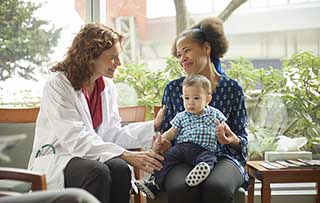Kidney disease and pregnancy: It’s challenging, but possible
November 12, 2019

Kidney disease changes many things in a woman’s life. But it doesn’t necessarily take away her desire to have a baby.
Separately, both pregnancy and kidney disease are hard on the body. The same is true of conditions that affect kidney function, such as diabetes, lupus, and chronic high blood pressure.
Together, however, pregnancy and kidney disease present complications to a patient’s current and future health. Women with chronic kidney disease are at higher risk for complications such as preeclampsia, restricted fetal growth, preterm delivery, and need for cesarean-section (C-section).
These challenges must be carefully managed with the help of a specialized care team that includes a nephrologist and a maternal-fetal medicine (MFM) doctor. In our high-risk pregnancy office, we approach prenatal care with these patients differently based on whether they:
- Had kidney disease prior to pregnancy
- Have received a kidney transplant, or
- Were diagnosed with kidney complications during pregnancy
Considerations for pregnancy with kidney disease
Kidney disease prior to pregnancy
If you have existing kidney disease, we’d ideally like to see you prior to becoming pregnant to help optimize your health. Conditions that affect the kidneys are associated with an increased risk of fetal complications such as preterm birth and pregnancy loss. Some women with moderate to severe kidney disease develop end-stage renal disease after pregnancy.
Patients are also at increased risk for worsening of existing iron-deficiency anemia, reduced vitamin D levels, and high blood pressure. Your nephrologist and MFM can help get your red blood cell, vitamin D, blood pressure, and blood sugar to acceptable levels before pregnancy to help reduce risks to you and the baby.
During dialysis, pregnant patients face additional challenges. Low kidney function means patients’ bodies store more waste products, which can be detrimental to the growing baby. Dialysis also contributes to fertility changes. Some are biological, such as changes in ovulation and effects of medication that alter the menstrual cycle. Others are emotional, such as not feeling up to having sex or feeling less attractive than when you were healthy. However, the National Kidney Foundation reports that sexual function and desire returns for most patients after dialysis or transplant.
While it might be difficult, pregnancy on dialysis is possible. A recent study on fertility during dialysis showed that 18 of every 1,000 women in the study became pregnant during dialysis. Talk with your care team to determine whether pregnancy is safe for you, as well as your options to increase the chance for positive outcomes.
Related reading: ‘Can’t get pregnant’ vs. ‘shouldn’t get pregnant’: Know the difference
Received a kidney transplant
After a kidney transplant, we generally recommend women wait one to two years after transplant to conceive. Patients can safely consider pregnancy once their risk of organ rejection has been deemed low and stable kidney function is established.
Pregnancies after kidney transplant tend to have better outcomes than pregnancies during dialysis. Continue to manage your blood pressure and talk with your nephrologist about your rejection medications. Many of these drugs are safe during pregnancy but some can cause birth defects or pregnancy complications. Your care team can help you find a safer alternative, ideally before you conceive.
Diagnosed with kidney complications during pregnancy
Aside from renal disease, other health conditions can cause kidney trouble during pregnancy:
- Infections: Asymptomatic bacteriuria is a urinary tract infection without symptoms. Left untreated, it can evolve into a kidney infection (pyelonephritis). Kidney infections usually require hospitalization and IV antibiotic therapy. Complications are more severe in pregnant women and can include respiratory issues for mom and preterm delivery.
- Kidney stones: Pregnancy does not increase the risk of kidney stones. However, the dilation of the ureter that comes during pregnancy might make it easier for you to pass stones during pregnancy. Treatment usually consists of hydration and over-the-counter pain medicine.
- Preeclampsia: Pregnancy-related high blood pressure is associated with reduced kidney function and can lead to preterm birth. High amounts of protein in the urine can be a warning sign of preeclampsia, so we check for it often. That’s why we ask for so many urine samples at prenatal appointments toward the end of your pregnancy.
Patients who hemorrhage or have placental abruption might develop acute kidney injury (AKI), or sudden kidney failure. Fortunately, management of these conditions has improved, and AKI is not common.
What to expect during and after delivery
Your doctor will check your blood pressure regularly. In some cases, we will recommend aspirin therapy to help manage blood pressure. We will also want to monitor fetal growth using ultrasound during the second and third trimesters.
If you or your baby experience concerning issues, the doctor might recommend that you deliver a few weeks early. You might be induced or have a scheduled C-section – your care will be individualized.
We’ll also talk about long-term birth control options such as intrauterine devices (IUDs) to help you avoid another pregnancy until you are ready.
If you have kidney disease and want to become pregnant, we want to see you. Together, we can navigate your challenges and provide the knowledge you need to make informed decisions about your pregnancy.
Do you need to see an MFM doctor? Call 214-645-8300 or request an appointment online.










